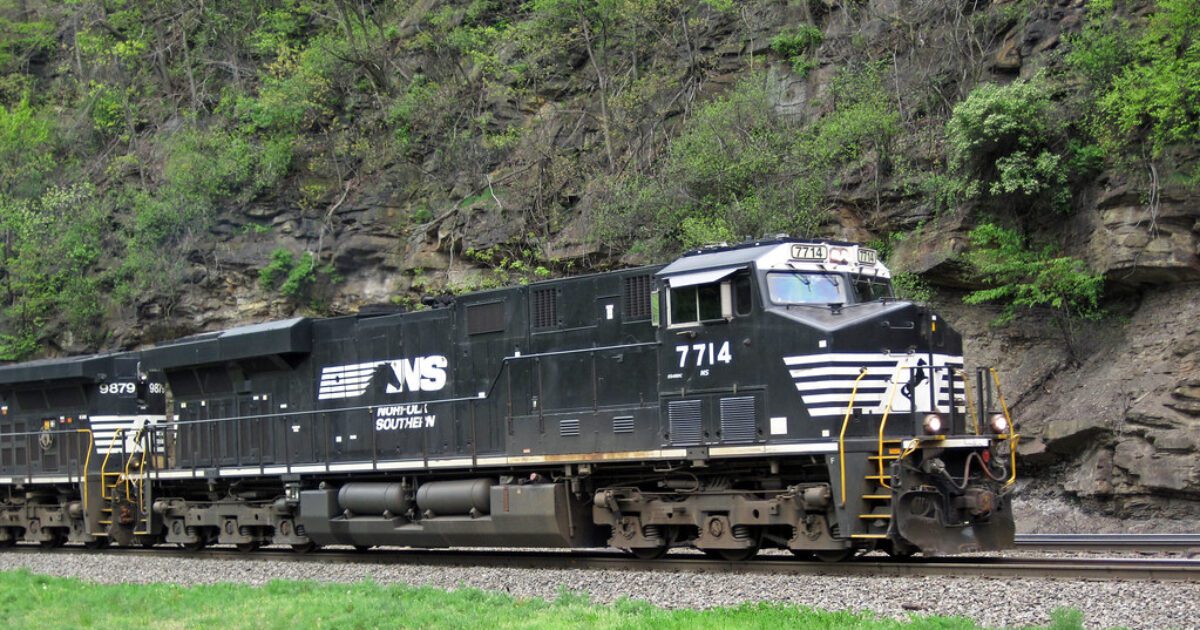When the Norfolk Southern train derailed in East Palestine earlier this month, it wasn’t the first time that particular train had problems.
According to employees, the train broke down at least once before its derailment in East Palestine.
Surveillance footage captured about 20 miles from East Palestine showed apparent problems with one of the rail cars.
The employees believe the train's extensive length and weight led to the problems and derailment.
CBS News reported:
The employees say there were concerns among those working on the train over what they believed was the train's excessive length and weight — 151 cars, 9,300 feet long, 18,000 tons — before it reached East Palestine, which contributed to both the initial breakdown and the derailment.
In the two weeks since, many residents who were home at the time of the derailment, or who returned after authorities conducted a "toxic release" of the hazardous chemicals on board, have told CBS News they are suffering from headaches, rashes, respiratory problems and painful coughing.
"We shouldn't be running trains that are 150 car lengths long," one of the employees said. "There should be some limitations to the weight and the length of the trains. In this case, had the train not been 18,000 tons, it's very likely the effects of the derailment would have been mitigated."
CBS News has agreed not to name the employees because they fear retaliation by Norfolk Southern.
Norfolk Southern's CEO Alan Shaw declined an interview. In a statement to CBS News, a company spokesperson said "the weight distribution of this train was uniform throughout" and included a mid-train locomotive "which helps manage the dynamic forces of the train" and reduces mechanical issues.
It's not surprising that Norfolk Southern employees would make claims about the railway cutting corners to bypass safety and boost profits.
Norfolk Southern lobbied federal regulatory agencies to weaken federal safety rules on trains transporting hazardous materials.
The company has also reportedly cut employees while raising the pay for executives.
The Lever explained:
Before this weekend’s fiery Norfolk Southern train derailment prompted emergency evacuations in Ohio, the company helped kill a federal safety rule aimed at upgrading the rail industry’s Civil War-era braking systems, according to documents reviewed by The Lever.
Though the company’s 150-car train in Ohio reportedly burst into 100-foot flames upon derailing — and was transporting materials that triggered a fireball when they were released and incinerated — it was not being regulated as a “high-hazard flammable train,” federal officials told The Lever.
Documents show that when current transportation safety rules were first created, a federal agency sided with industry lobbyists and limited regulations governing the transport of hazardous compounds. The decision effectively exempted many trains hauling dangerous materials — including the one in Ohio — from the “high-hazard” classification and its more stringent safety requirements.
Amid the lobbying blitz against stronger transportation safety regulations, Norfolk Southern paid executives millions and spent billions on stock buybacks — all while the company shed thousands of employees despite warnings that understaffing is intensifying safety risks. Norfolk Southern officials also fought off a shareholder initiative that could have required company executives to “assess, review, and mitigate risks of hazardous material transportation.”
“The workers are exhausted, times for car inspections have been drastically cut, and there are no regulations on the size of these trains,” an employee said.
According to Jared Cassity, the national legislative director for one of the unions that represents Norfolk Southern workers, the company likely cut corners during safety inspections.
"There's a good chance the car that derailed had not been properly inspected for some time," Cassity said.
"You combine that with the added length and tonnage, plus the fact that it had all this hazardous material, and this was predictable. If nothing changes, it will happen again," he added.
Norfolk Southern now faces numerous lawsuits for the train derailment in East Palestine.
The Western Journal added:
Norfolk Southern is facing a class-action suit in connection with the derailment that said the derailment and toxic cloud that eventually enshrouded East Palestine, Ohio, “would never have occurred if not for failure on top of failure by Norfolk Southern.”
“Train 32N should never have been operated in such a reckless manner that its wheel bearings would fail and cause derailment of a train carrying highly toxic and combustible substances. Even after derailment, the integrity of cars containing highly toxic and combustible substances should not have breached, and emergency pressure relief valves should have functioned as designed,” the suit states.
“Nevertheless, Norfolk Southern layered on yet more failures once it found its derailed train at imminent risk of catastrophic detonation. Norfolk Southern blew holes in its vinyl chloride cars and dumped 1,109,400 pounds of cancer causing Vinyl Chloride directly into the environment,” the suit states.
Another lawsuit against Norfolk Southern claims “residents exposed to vinyl chloride may already be undergoing DNA mutations that could linger for years or even decades before manifesting as terrible and deadly cancers.”



Join the conversation!
Please share your thoughts about this article below. We value your opinions, and would love to see you add to the discussion!